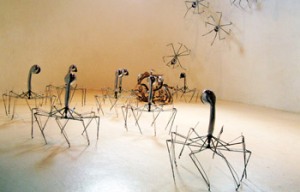Aug 2 2013
Scientists and technologists from around the globe are uniting to explore the future of biomimetic and biohybrid technologies this week (Monday 29 July – Friday 2 August 2013) with a focus on future life-like robots.
 Arachnoid robots
Arachnoid robots
Living Machines is a weeklong event taking place at the Natural History Museum and the Science Museum in London that brings together leading international academics to showcase the latest advances in their field, discuss their societal implications and debate the future of artificial intelligence.
The event is organised by the EU-funded Convergent Science Network (csnetwork.eu) which is led in the UK by the University of Sheffield.
The highlight of the week will be a one day exhibition of “Living Machines” on 1 August that will include 39 exhibits with live technology demonstrations and artworks from around the world.
The conference is co-organised by leading biomimetic scientists Professor Tony Prescott from the University of Sheffield and Professor Paul Verschure from University Pompeu Fabra, Barcelona.
Cutting-edge biomimetic technology in the spotlight will include robots that move and sense like animals, with worm, insect, octopus, fish, mouse, dog, and human-like robots on display. The exhibit also includes interactive demonstrations such as a helmet with special sensing abilities for fire fighters of the future, a device that allows you to see like a chameleon, and a robot DJ who interacts with you to compose music. Biohybrid exhibits, that mix biological and artificial parts, include an emotionally-expressive robot controlled by slime mould, biohybrid clothing made with living cells, and a robot that powers itself by digesting human urine. The exhibition also features some of the latest biomimetic medical devices including new techniques for minimally-invasive surgery.
A dance performance featuring the iCub humanoid robot, live visual art and a string quartet performing music in the style of Mozart and Vivaldi, but composed by artificial intelligence, are a few examples of the engineered artistic possibilities that will be demonstrated.
The University of Sheffield has contributed multiple exhibits to the event through the Sheffield Centre for Robotics (SCentRo, jointly established with Sheffield Hallam University) including integrated exhibits on Emergence and Evolution and Nature-inspired Touch.
On Friday 2 August 2013 from 9am-5pm at Imperial College London there will be a series of talks on the societal impact of robots in areas such as assistive robotics, military and surveillance robotics, companion robots, and physical and neural prosthetics. Academics will consider some of the short to long term ethical, legal and societal issues that could arise from these new technologies. Topics covered include runaway artificial intelligence, lovotics and sex with robots, fear of machines, robot and human pain, mechanical bodies and mythical minds.
Professor Tony Prescott from the University of Sheffield’s Department of Psychology said: “The Living Machines conference is a unique opportunity for world-leading experts to explore the latest exciting innovations that the field of biomimetic and biohybrid technologies has to offer. These technologies will have a profound effect on many different aspects of our future lives, posing important ethical questions and practical concerns that this event gives us chance to address.”
A Programme for the Living Machines exhibition can be downloaded here Living Machines Exhibition. Admission to the exhibition and workshop is only by advance registration at the above link.